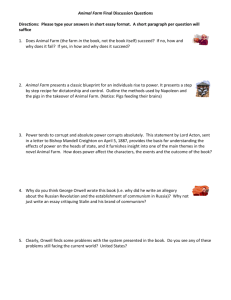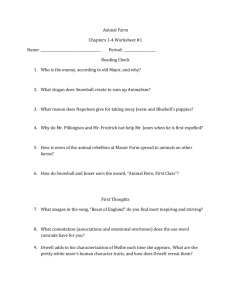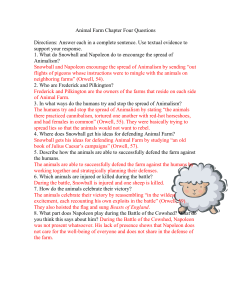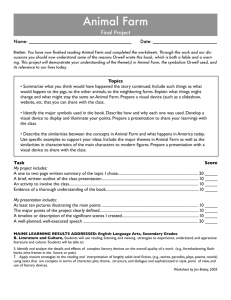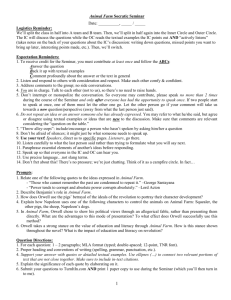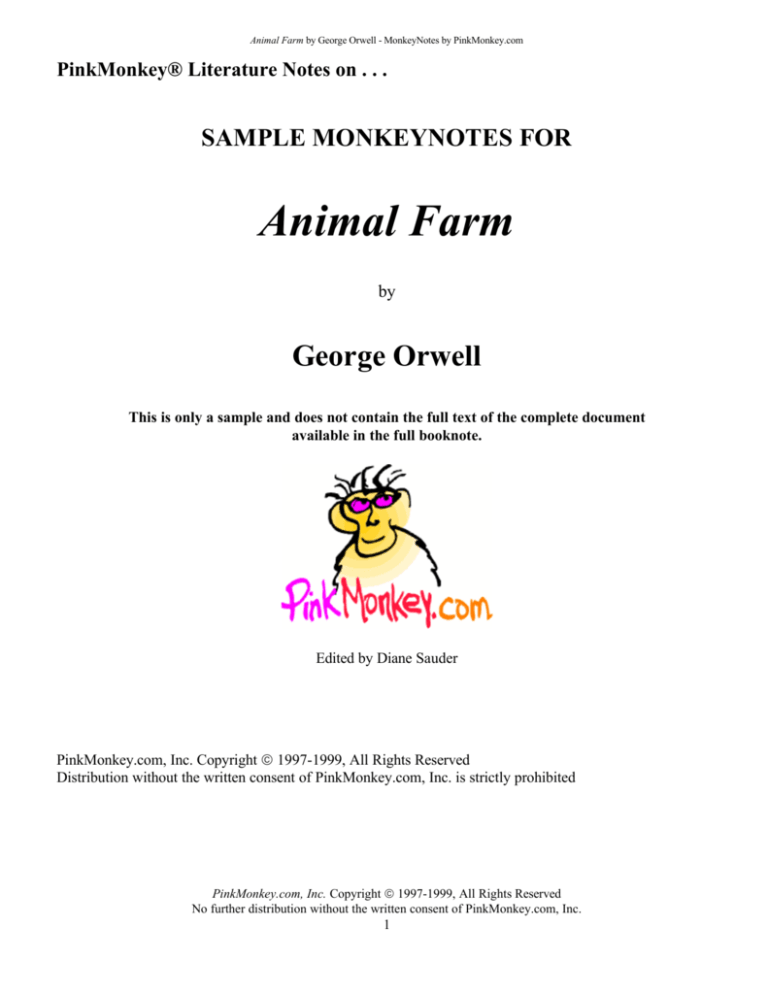
Animal Farm by George Orwell - MonkeyNotes by PinkMonkey.com
PinkMonkey® Literature Notes on . . .
SAMPLE MONKEYNOTES FOR
Animal Farm
by
George Orwell
This is only a sample and does not contain the full text of the complete document
available in the full booknote.
Edited by Diane Sauder
PinkMonkey.com, Inc. Copyright 1997-1999, All Rights Reserved
Distribution without the written consent of PinkMonkey.com, Inc. is strictly prohibited
PinkMonkey.com, Inc. Copyright 1997-1999, All Rights Reserved
No further distribution without the written consent of PinkMonkey.com, Inc.
1
Animal Farm by George Orwell - MonkeyNotes by PinkMonkey.com
KEY LITERARY ELEMENTS
SETTING
The novel is set in Hertfordshire, where Orwell lived, wrote, tended his garden, and kept poultry. Though the
setting is the South of England, it is not stressed in the story, but serves only as a background. The farm…….
CHARACTERS
Old Major - An old boar that dreams of a better life and incites the animals to overthrow man. He is the
inspiring force behind the Rebellion and founding of Animal Farm.
Snowball - A young, intelligent, persuasive, and important boar known for his oratory skills. He is expelled
by Napoleon.
Napoleon - An ambitious, power-hungry, ruthless and eminent boar who stoops to any level to gain his goal.
Boxer - A big, powerful, honest, and devoted carthorse who does not have many brains but always comes
forward whenever any hand work is needed.
Clover - A motherly mare who is truly concerned about the welfare of the animals. She has a good shoulder to
cry on and is a source of strength and confidence, especially to Boxer.
Benjamin - A cynical, skeptical donkey who believes everything remains the same with………
CONFLICT
The conflict in Animal Farm is really between Marxist Socialism (Old Major) and Russian Communism
(Napoleon) as represented by the two attitudes expressed by the two different groups in the novel.
Protagonist - The protagonist is the group of common animals searching for a utopian world and largely
represented by characters like Old Major and Snowball and supported by the 'proletariat'.
Antagonist - The antagonist is the combination of all the forces acting against such an idealistic world, largely
represented by the power-hungry Napoleon and his henchman, Squealer.
Climax - The ultimate climax is reached when Napoleon changes Animal Farm into a republic and elects
himself President, assuring the maintenance of his seized power. The result of Napoleon’s……..
PLOT(Synopsis)
Mr. Jones, the owner of Manor Farm, has not been a very responsible farmer. Of late, he has taken to drinking
and tends to neglect his farming chores. His careless attitude makes Old Major, the Berkshire boar, incite the
animals to rise up against Jones. The boar calls for a meeting to explain his dream for the farm animals.
Although Old Major does not narrate the dream, he does explain the ill treatment given to them by man and
the dreary and deplorable life they are leading on the farm. He also inspires the animals with his song 'Beasts
of England.'
PinkMonkey.com, Inc. Copyright 1997-1999, All Rights Reserved
No further distribution without the written consent of PinkMonkey.com, Inc.
2
Animal Farm by George Orwell - MonkeyNotes by PinkMonkey.com
The inspired animals seize their very first opportunity to oust Mr. Jones and rename the farm as “Animal
Farm”. They inscribe their laws, seven commandments, on the barn-wall. Napoleon and Snowball ……..
THEMES
Major Theme
The major theme of the novel is the sad triumph of evil over good. The animals try to create a utopia, a
paradise where society brings out and develops the best in a being. Unfortunately, the animals that gain
control of Animal Farm begin to act in a manner similar to the humans that they had kicked off the farm. At
the end of the novel, the pigs cannot be distinguished from the humans.
Minor Theme
Power corrupts and absolute power corrupts absolutely is another theme of Animal Farm. When the animals
seize control of the farm, the leaders are corrupted by their power. Allegorically, Orwell is ……….
MOOD
The mood varies from the comic to the tragic, with the overall mood being one of tension. The whole story is
filled with irony and bitter sarcasm.
BACKGROUND INFORMATION
GEORGE ORWELL
George Orwell was the pen name of an English writer, Eric Blair. He was born in Motihari, Bengal in India in
1903, the second child of an Anglo-Indian family. At the age of eight, he was sent to boarding school in
England. After winning a scholarship, Orwell went to Eton, where he studied from 1917 to 1921 and was
exposed to liberal and socialist ideas. From 1922 until 1927, he served in the Indian Imperial Police in Burma;
he resigned because the climate affected his health and because he believed that the British rule in Burma was
unjust. He returned to Europe to pursue a writing career and first lived in Paris and then London. At first he
could not find a publisher for his works. As a result, he led a life of poverty, doing odd jobs to…….
LITERARY/HISTORICAL INFORMATION
It is important to realize that George Orvwell wrote Animal Farm on various levels:
As a Children's Story - The novel is a children's story in its own right because the author tried to parody the
style of children's books. He wrote an animal story simple enough for a child, but added……….
As a Fable - Animal Farm is a fable in the sense that its characters are animals, each with his own personality
and human characteristics. The animals think, meet, talk, act, obey, disobey, aspire, fight, and ……..
As a Political Satire - Animal Farm is also an example of a literary form known as 'Political Satire,' blending
a critical attitude with wit and humor for the purpose of mocking or ridiculing the follies of man's political
behavior and institutions. To be effective, satire must be terse and concise, to say a great………..
The novel meets all the requirements of a good satire because:
PinkMonkey.com, Inc. Copyright 1997-1999, All Rights Reserved
No further distribution without the written consent of PinkMonkey.com, Inc.
3
Animal Farm by George Orwell - MonkeyNotes by PinkMonkey.com
A. It is inspired by a personal grievance or a passion for reform, for Orwell's Spanish experience and antiStalin obsession inspired Animal Farm.
B. It is an attack on a group of persons or a social evil, for the book exposes Russian Communism and
arouses hatred for despotic rulers, such as the superior class of pigs and dogs.
C. It is intended to ridicule, not abuse, though it is often bitter, for Orwell ridicules the 'short memory' of the
animals, who quickly forget what has happened to them in the immediate past and begin ……….
CHAPTER SUMMARIES WITH NOTES
CHAPTER 1
Summary
In the opening chapter of the book, Mr. Jones of Manor Farm is shown as a careless, irresponsible farm owner
who cares more for a glass of beer than for his animals and the farm. He is often drunk, and his ensuing
negligence causes the farm animals to protest and rebel against him.
One night, Old Major, the prize Middle White Boar, wishes to share a strange dream with all the animals.
Since the two-year old boar is greatly respected by all, the animals are willing to forego an hour’s sleep to
listen to Old Major’s tale. Before the animals assemble, the stout, majestic Old Major makes himself
comfortable on his bed of straw. As the animals enter the barn, each is described. First to come are the three
dogs, Bluebell, Jessie, and Picher. Then the pigs arrive and settle down in front of the platform. Clover, the
stout, motherly mare, who is nearing middle age, finds her place. Benjamin, the cynical donkey, who is the
oldest animal and the worst tempered, grumps as he settles down. Boxer, who is an enormous and optimistic
horse, Mollie, who is the foolish, pretty white mare, Moses, who is the tame raven, and the cat are all present.
The hens perch on the windowsills, and the pigeons flutter up to the rafters.
Major's intentions are noble. He shows concern for the welfare and destiny of the animals and inspires them to
rebel against the human beings for their own good. Without ever telling his dream, he diverts the animals’
attention to his song, 'Beasts of England'. He encourages them to gather in perfect unity and warns them to
avoid the habits of men.
Notes
The first chapter clearly establishes the point of view of the entire novel. The story is told by an observing
narrator who is outside the action of the story. He appears to be an average being who is unbiased; therefore,
he can be trusted and believed. He also tells the story in a direct and concise manner, which is very effective.
This point-of-view also helps Orwell successfully express the wishes, expectations, obedience, unity, and even
protest of the animals.
The chapter also begins to establish the personalities of the animals, who act like animals and think and talk
like human beings. True to animal behavior, Boxer and Clover trot like horses, and the cat selfishly looks
after its own needs in a typically feline way. In contrast, Old Major, talking like a man, appears to be a
polished statesman, more human than boar. He convinces the animals that they are poorly treated and deserve
better. He describes instance of man’s repeated cruelty to them. He then paints a picture of a happy future,
when humans have been removed and the animals rule themselves. The groundwork for an animal farm and
PinkMonkey.com, Inc. Copyright 1997-1999, All Rights Reserved
No further distribution without the written consent of PinkMonkey.com, Inc.
4
Animal Farm by George Orwell - MonkeyNotes by PinkMonkey.com
its rules of behavior are established in Old Major’s speech. He specifically points out which human vices must
be avoided by the animals when they rule the farm.
Old Major’s philosophy is overly simplistic. He is convinced that humans are bad and animals are good. He
also believes the good life is one ruled by animals in an easy-going, pastoral setting, as described in the song
‘Beasts of England.’ The fact that the other animals accept his philosophy is seen when they join in the
singing and repeat the song five times, waking Farmer Jones from his drunken sleep in the process.
Old Major’s speech also sets the slowly rising action of the plot in motion. It suggests the idea of animal
freedom and hints that a leader is needed for the animal rebellion. Unfortunately for the animals, the leader
who emerges is a tyrant and the animal’s plight goes from bad to worse by the end of the novel.
It is important to notice how Orwell positively describes the animals in the chapter. The fat Old Major is “still
a majestic looking pig, with a wise and benevolent appearance.” The stout Clover is described as a “motherly
mare that had never got her figure back after her fourth foal."
It is also important to notice that politically, Old Major represents a blend of Marx and Lenin, the leaders of
Communism in Russia. It was Marx, like Old Major, who had a 'strange dream' about the "proletariats'
overthrowing of the bourgeoisie" to end capitalistic tyranny. 'Beasts of England', the animal anthem of the
revolution, reflects Lenin’s idea of unity among workers. Through Old Major, Orwell has developed the first
stage of revolution, which is an intense fight for an ideal.
CHAPTER 2
Summary
The second chapter commences with the peaceful death of Old Major. Although he is no longer physically
present, Major's inspiring speech has brought about a changed outlook on life among the animals. They are
convinced that an animal rebellion will take place in the unknown future and prepare for it psychologically.
The work of organizing and teaching naturally falls upon the most intelligent of the animals, the Pigs. Preeminent among them are two young boars called Snowball and Napoleon. Napoleon, a fierce looking
Berkshire, is not much of a talker but has a reputation for getting his own way. Snowball, a young boar, is
high-spirited, quick in speech, very intelligent, and inventive. Squealer, a nimble, quick thinking pig, is also
introduced as a brilliant, persuasive talker who can turn black into white. These three pigs advocate, expound,
and propagate Major's teachings, which are called 'Animalism'.
The rebellion is achieved much earlier, more accidentally, and more easily than any of the animals expected.
When Jones fails to feed them for a day, the animals break into the storage shed and eat heartily. The farmer
and his men try to beat the animals away with whips, but they grow angry over this mistreatment and fight
back. Jones is quickly expelled, and the gate is locked against him. Manor Farm now belongs to the animals.
They caper in joy and burn everything that reminds them of Farmer Jones and his cruelty. They sing 'Beasts of
England' seven times and then sleep better than they ever have before. The next day the animals can hardly
believe they really control the farm.
The pigs begin to teach themselves to read and write. Snowball, the best at writing, paints over the name
Manor Farm and clearly writes Animal Farm in its place, while the animals cheer him on. Snowball and
Napoleon then reduce the principles of Animalism to 'Seven Commandments,' which are inscribed on the barn
wall. They are the unalterable laws by which all animals of Animal Farm must live forever.
PinkMonkey.com, Inc. Copyright 1997-1999, All Rights Reserved
No further distribution without the written consent of PinkMonkey.com, Inc.
5
Animal Farm by George Orwell - MonkeyNotes by PinkMonkey.com
Snowball then asks the animals to gather the harvest more quickly than Jones demanded. Although the cows
are uneasy over the request, the animals march to the hay field to gather the important harvest. When they
return, they are surprised to find that the milk has disappeared.
Notes
The second chapter further develops the farm animals as individuals. Mollie, who has been spoiled by human
beings and asks the stupidest of questions; Moses, who claims to know the existence of a country called
Sugarcandy Mountain to which all animals go after death; and Boxer and Clover, faithful disciples who lead
the singing of the anthem, are all individualized. However, it is Snowball and Major who emerge as the
leaders of the animals; but they are very different in personality. Snowball is devoted and sincere, working for
the welfare of others; as the diligent organizer on the farm, he is much like Trotsky. On the other hand,
Napoleon is power-hungry and leads with an iron fist. He becomes a totalitarian despot, much like Stalin or
Hitler. Together they created the Seven Commandments of Animalism, based on Major's teachings, Marxism,
and the Communist Manifesto.
The second chapter also describes Manor Farm as the perfect setting for the utopian community that Old
Major dreamed about. It is pleasant in appearance, pastoral in appeal, and isolated enough to prevent outside
interference. Under the leadership of Napoleon and Snowball, the rebellion quickly takes place here almost by
accident, and the farm is transformed into Animal Farm. Orwell skillfully brings out the feeling of neglect
leading to rebellion in just two paragraphs.
There is some resistance to the new way of things on Animal Farm. Mollie symbolizes the ‘don't care-type,’
who has no interest for reform which interferes with personal pleasure or comfort. Moses, the raven,
represents the class who resists any change and becomes a symbol of organized religion. In contrast, Boxer
and Clover, the faithful work horses, represent the selfless, sincere party-workers who put the cause of the
party above themselves. Although they do not have great intelligence, they are respected for their strength,
open-heartedness, dedication, and steadfastness. Like most simple and gullible beings, they are easily
persuaded and convinced.
It is important to notice the irony that begins to take shape in the second chapter. Animal Farm should be the
perfect place for a utopian society, but in the hands of the animals it becomes a terrible place ruled by a tyrant.
At first the animals hate the farmhouse, where Jones lived with his horrible whips and whiskey; later the
animals will move into the farmhouse, and Napoleon will walk on his hind legs and carry a whip. The animals
believe that humans are the cause of all their problems; but over time, the animals become very human and do
themselves in. The animals believe the pigs to be the best leaders, for they talk intelligently; in truth, their talk
covers their motives. Old Major’s ideals, expressed in his speech, are noble; but in the “hands” of Napoleon,
they become evil. The Seven Commandments are supposedly unalterable, but they are later altered by the evil
leaders for their own good. The commandments are also not really a philosophy, but mere propaganda.
It is also important to notice the style of the second chapter. The quick pace involves the reader and creates a
believable suspension of reason and logic, giving the story the feel of a fairy tale that teaches that selfishness,
pride, and hypocrisy are hard to eliminate from society. Since these are timeless weaknesses of mankind, the
story becomes a timeless tale of society’s corruption throughout history, not just in the time of Marx, Stalin,
or Lenin………
PinkMonkey.com, Inc. Copyright 1997-1999, All Rights Reserved
No further distribution without the written consent of PinkMonkey.com, Inc.
6
Animal Farm by George Orwell - MonkeyNotes by PinkMonkey.com
OVERALL ANALYSES
CHARACTERS
Old Major - Old Major has been a show pig for Farmer Jones. As a result, he has been pampered and has
lived a life of ease. Unlike the other farm animals, he has not been expected to do hard labor or scratch out a
meager existence for survival. Most of the time he has been isolated in a stall filled with clean hay and plenty
of food, allowing him much time to think, theorize, and observe the other animals at a distance. As a result,
he does not have a realistic picture of the nature of animals or humans.
Old Major dies at the end of the first chapter and is buried on the farm. After the animal rebellion, his skull is
dug up and paid weekly tributes by the animals for a period of time. Even after the formal tributes have
ceased, the common animals speak about Old Major and consider him their hero. Napoleon mentions him at
the end of the book when Old Major's vision is a problem for him with the other animals.
Snowball - Snowball is one of the pre-eminent pigs who is a contender for leadership of Animal Farm. He is
more vivacious, quicker in speech, and more inventive than Napoleon. He is also much more concerned about
the welfare of all the animals. He proves that he is a good thinker, strategist, and planner. He not only plans
the 'Battle of Cowshed' in advance, but also fights bravely during the battle and is acclaimed a……….……..
PLOT
The plot structure of 'Animal Farm' is fairly simple and straightforward. The first chapters are concerned with
the rising action, when the animals rebel and seize the farm, when Snowball and Napoleon vie for leadership,
when Snowball is expelled, and when Napoleon sets himself up as the dictatorial leader of………….
STYLE
Orwell’s style in the novel is simple, sensitive, observant, straight forward, and honest. With lucid language,
he tells a simple story of animals seizing a farm for themselves and how Napoleon becomes the………
POINT OF VIEW
Orwell tells the story of Animal Farm through a third person, impersonal and omniscient point of view. The
narrator is never involved in the action of the story, but seems to appear somewhere outside or above
everything that is going on. This point of view allows Orwell to see into the minds of the characters and
understand their motivations. As a result, Orwell lets his readers know what the animals do………..
ALLEGORY
An allegory is a series of metaphors or symbols continued throughout an entire story so as to represent or
describe one series of facts by using another that is analogous to its main features. 'Animal Farm' is intended to
be an allegory of Russian history from 1917-1943, including the period of World War I, the Economic Policy
Plan, and the first Five Year Plan. All the characters of 'Animal Farm' parallel figures in……..
Animal Farm
=
History of Russia
Old Major’s philosophy
=
The philosophies of Marx and Lenin
PinkMonkey.com, Inc. Copyright 1997-1999, All Rights Reserved
No further distribution without the written consent of PinkMonkey.com, Inc.
7
Animal Farm by George Orwell - MonkeyNotes by PinkMonkey.com
Animalism
=
Communism
Other Animals
=
Bolsheviks (common people )
Mr. Jones
=
Czar of Russia
Seven Commandments
=
Communist Manifesto
Skull of Old Major
=
Lenin's body
Old Major's death
=
Lenin's death followed by struggle for power
Windmill Construction
=
Russian construction of steel mills and electric plants
Napoleon's sale of timber to Frederick
=
Stalin entered into a non-aggression pact with
Hitler's Germany
Frederick's declaration of war on
Animal Farm
=
Hitler's declaration of war on Russia
Windmill destroyed, animals died
=
Stalingrad destroyed
Sugarcandy
=
In 1944 Stalin wrote letters to Pope to conduct services
Napoleon's entertaining of humans in
the
farmhouse
=
Different meetings between Stalin and Churchill in Russia
.
QUESTIONS
1. Describe the teaching of Old Major.
2. Describe the origin and spread of Animalism………...
END OF SAMPLE MONKEYNOTES FOR ANIMAL FARM BY GEORGE ORWELL
PinkMonkey.com, Inc. Copyright 1997-1999, All Rights Reserved
No further distribution without the written consent of PinkMonkey.com, Inc.
8



